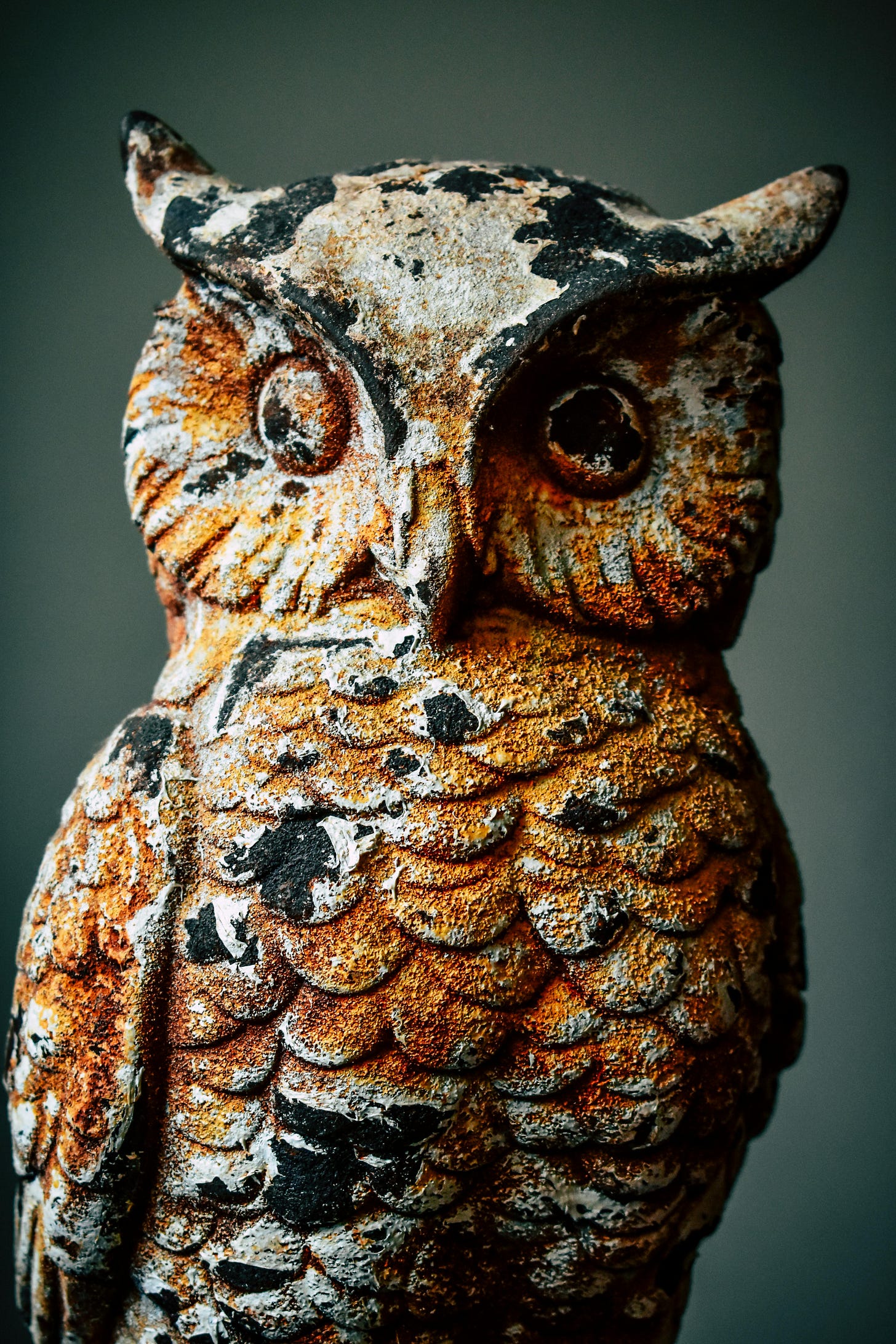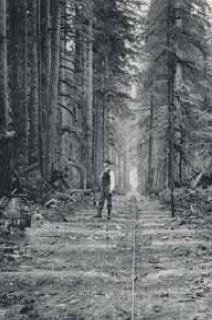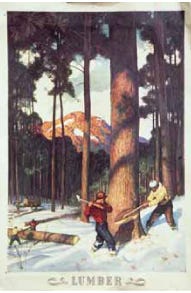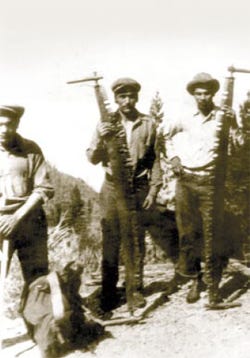CHAPTER 6: I Won’t Leave
Ginnie and Grace walked a block to the Silver Dollar Tavern. Inside, old logging and mining equipment, mounted deer and elk heads decorated the walls.
Half a dozen men eyed the ladies as they hung their coats by the door and settled at a table in the middle of the room.
A boy of about ten hung around the bar, his ears the biggest thing on him, while Tim McGraw crooned “Live Like You Were Dying” from the corner jukebox.
Skydiving / I went Rocky Mountain climbing / I went 2.7 seconds on a bull named Fumanchu / And I loved deeper / And I spoke sweeter / And I watched an eagle as it was flying.
And he said / “Someday I hope you get the chance / To live like you were dying / To live like you were dying / To live like you were dying
Ginnie pulled a pickle jar out of her big purse and set it on the edge of the table. She popped in a five. Grace raised an eyebrow. “Later,” said Ginnie.
They ordered their meals from the owner, a swarthy man with a crew cut. “How’s business, Fred?” asked Ginnie.
“Off a hair,” he replied without looking up from scribbling their order. Grace noticed that he too wore a tan bow with white stripes and spots as did other patrons in the bar. Stripes with spots was repeated on hats and shirts, as were images of owls. There was a statue of an owl in the corner by the bar.
The boy by the bar leaned over the counter, grabbed a couple of bags of chips and ran out the door. “Hey!” yelled Fred. “Damn kids. Well, I ain’t gonna chase him. What’d he get?” he asked the men sitting at the bar.
“Fritos, Fred,” said one. “Two of the big bags.”
“Porter kid, the oldest,” added another.
“Hell,” said Fred, “I’ll never collect.” He stuffed a handful of tips into Ginnie’s pickle jar and disappeared into the kitchen. Another diner added a five on his way out, pushing it deep into the jar. Diners walked by, adding ones and fives, and spare change to the collection.
“The Yellow Ribbon Alliance,” said Ginnie, “was formed decades ago in response to environmental overregulation. Used to mark trees for cutting, yellow ribbons are symbols of our solidarity against the destruction of America and its security via the elimination of multiple use of our communally-owned lands and forests for food, fiber and energy production.”
A bald man in a rumpled suit entered and waved to Fred behind the counter. “The usual, Fred,” he said, adding, “To go.” Fred nodded. “Thanks,” said the man scanning the room. He waved at the ladies, walked over. “Ginnie,” he said, taking a seat.
“Grace,” said Ginnie, “meet Jim Brigham, City Council Member. “Jim, this is Grace Newman, L.A. Tribune.”
“Well,” he said, shaking her hand. “I don’t think an L.A. paper ever sent a writer out here. Ginnie?”
“Not that I recall. Lotsa Googling. Cut ’n’ paste journalism; now cut ’n’ paste AI.”
“Well, it’s nice to be here,” said Grace as Five Times August started up on the jukebox.
So shut your mouth, get in line / Just behave or pay the fine / They're pulling on your backbone / And taking out your spine
They want you weak, don't speak / Don't question, don't think / Keep staring at your smart phone / Get dumber every week
Don’t nobody put up a fuss / Oh, Jesus, what happened to us? Oh, Jesus, Jesus, what happened to us?
After small talk about the weather, Jim Brigham shared his views. “City services,” he said, “rely on revenue from the value of standing trees, tax on trees cut, sales and property taxes, and federal payments in lieu of taxes, PILTs. We’ve lost mills and population so revenue has collapsed since the owl was listed. Services are strapped as social costs increase. The unemployed need more of everything—retraining, counseling, housing assistance, food programs. Poverty delivers some things in abundance—alcoholism, drugs, disease, anger, depression, suicide. Desperation delivers theft, crime, violence.”
He shook his head. “In a nutshell, the middle class is imploding,” he said. “The timber wars hit the little guys pretty hard, wiped ’em out and now we’re dealin’ with mega-multi-nationals with no sense of place. They ship in labor from who knows where. Toss in a pandemic and it’s a friggin’ train wreck.”
“COVID regs hammered us. Lockdowns, shutdowns,” said Ginnie. “Lost more shops on Main Street, two more restaurants. Add in the legal and illegal cannabis crop biz on federal lands with its illegal labor force poisoning wildlife, owls and our water, hiding their cash who knows where…”
“Doesn’t take a rocket scientist to see we’re going broke, but fast,” said Jim. “This town’s dyin’ and I for one will be sad to see it go. Used to be a nice place to live.”
“Yeah,” said Ginnie wryly, “doesn’t have to be this way. It’s not like we’re out of customers for wood. We’ll certainly never run out of trees.”
“Or owls,” added Jim. “Not unless fire takes it all, I guess. Whole lot of sufferin’ for nothin’ and helpless to stop it.”
Grace withheld her opinion as Fred arrived with their food. Brigham’s was wrapped to go. “Got a meeting,” said Jim, handing her his card. “Need anything, Ms Newman, just call. It was a pleasure.” He pushed a twenty into the pickle jar. “Ginnie,” he said. “Take care.”
“Good to see ya, Jim,” said Ginnie. “Say hello to the family for me.”
A group of soot-covered loggers entered, looking tired and thirsty but satisfied. “Any more bodies needed?” asked a man at the bar.
“Not unless we get another burn,” was the reply.
“Hey, Jim,” said one as Brigham headed out the door. Brigham said something, pointed to Ginnie and a little more cash trickled its way into the pickle jar. Oliver Anthony sang “Rich Men North of Richmond”.
Lord, it’s a damn shame what the world’s gotten to / For people like me, people like you / Wish I could just wake up and it not be true / But it is, oh, it is
Livin’ in the new world / With an old soul / These rich men north of Richmond / Lord knows they all just wanna have total control / Wanna know what you think, wanna know what you do / And they don’t think you know, but I know that you do / Cause your dollar ain’t shit and it’s taxed to no end / ‘Cause of rich men north of Richmond
I’ve been sellin’ my soul, workin’ all day / Overtime hours, for bullshit pay
Ginnie studied Grace. Pretty, she thought. Reasonable? she wondered. We’ll probably get beat up again in print, she mused, but she was encouraged that Grace had come to Silvercreek. Most reporters, she thought, prefer hanging out with the eco-crowd in Seattle, interviewing PhDs to confirm what they already believe: the only way to save forests is by removing humans.
Ginnie sighed. ‘We can’t save the forest if we preserve profit over the environment,’ was the mantra of those she saw as irritating true believers.
Ginnie took a breath, sat up and gave it straight. “Look, Grace,” she said, “a few reporters have come out here for a quick field trip, to see a fresh clear cut, interview a couple of yahoos who swear they eat spotted owl for breakfast. This town is going down and I would like, just once, to have a reporter arrive with an open mind and a caring heart. Is your story line already written or will you do right by us?”
“No preconceived notions here,” said Grace. “I’ll write it as I see it, so show it to me, what you know to be true.”
“Fair enough,” said Ginnie, exhaling and handing her an itinerary. “I’ve scheduled a tour of Armstrong Mill. They offered to include you on a helicopter trip to plan a selective cut. You’ll also visit a logging op. I hope you’ll attend our Yellow Ribbon meeting. I’ve made a few copies of your schedule and emailed it to you and the mill. Anything else you need?”
“Historical society?” asked Grace, perusing the schedule.
“At the library. My mom works there. We can stop by after lunch.”
“Tremendous, thanks,” said Grace.
Fred handed Ginnie the check and cleared the plates. Grace handed him her credit card.
“Can we get a few sandwiches to go? Maybe some milk?” asked Ginnie.
Grace shrugged. “Sure.”
Ginnie walked to the bar, carrying her pickle jar. She ordered some food to go. Fred scribbled the order, reached over the bar and touched a sooty logger on the shoulder, pointed at the pickle jar. The man added two dollars to the collection, handed it down the bar.
Ginnie wished the men “good loggin’,” and they added more bills to the overflowing stash.
Grace listened to the lyrics of “I Will Not be Leaving Quietly” on the juke box.
You can hate me, try to break me / Talk me down and denigrate me / You can try to silence every word
But I will not be leaving quietly, no / I won't leave / I won't leave / I will not be leaving quietly, no
“Five Times August’s popular up here,” she said to Fred as she signed the check.
“Good singer,” said Fred.
Grace nodded. “That he is.”
“Kind of speaks to us, out here in our war zone,” said Ginnie. “All set?”
Fred handed her a large brown paper bag. “Four tuna sandwiches, four milks,” he said. “Plus I tossed in a coupla apples, big chunka pie—pecan, from my sister’s trees in Spokane. I made a nice minestrone this week so I popped in a container full, plus a bag of beans for good luck. Oh, and half a round of my world-famous sourdough. Big pat of butter, a little jam.”
“Thanks so much, Fred,” said Ginnie tucking the pickle jar inside the bag. He waved off her thanks and wiped down the counter.
After the dark of the bar, the brightness outside hurt Grace and Ginnie’s eyes. The skinny man, Sam, hurried up to them, carrying his little girl. “I heard you was in there, Ginnie,” he said.
Ginnie gave him the brown paper bag. He looked inside and then studied the mud on his boots. “Thank you. Well, Ginnie, ya know…”
“All good, Sam,” said Ginnie, touching his arm lightly and looking sternly into his eyes. “It’s real important you get back on your feet,” she said. “God bless you and little Dana.”
Sam hung his head and left quickly, unwrapping a sandwich as he walked, tearing off a portion to share with Dana. Her grubby hands stuffed the food into her mouth and reached to Sam, opening and closing her little fists, the universal signal for wanting more. Grace and Ginnie turned away, silent as they walked past boarded up stores.
“He used to have the sweetest little house,” said Ginnie. “Bank took it, wife took off.” She shook her head. “That little girl should be taking dance lessons and going to birthday parties. There are too many like them now—and before it ends, there will be too many more.”
<><><><>
Inside the Silvercreek Library, a gracious old brick building, people enjoyed the free heating while reading and doing homework. Ginnie led Grace past computers and a display in the children’s section, How a Log Becomes a Book, to the research section in back.
Ginnie’s mother, Ingrid Hopewell, a stout woman in her sixties with bright, friendly eyes and wavy salt and pepper hair, greeted them. “Welcome to Silvercreek,” she said.
“Beyond being the librarian, Mom is a former mayor and current president of the Historical Society,” explained Ginnie. “What she doesn’t know about this town fits in a teacup.”
After Ginnie left, Grace took stock of the small but tidy research room decorated with a wall of sepia tone photographs of loggers, miners and trappers. Newer photos in color augmented the collection. The room was packed to the rafters with books. Doors led to back rooms filled with more books and papers. Two computers were available to access online archives.
“So, how may I help?” asked Ingrid.
“I’d like basic stats on timber production, a bit of background on the town.”
“Can do.”
“Anything you think will help expand my world view, throw them at me.”
Ingrid smiled. “Anything? I have some ideas there—if you’re open to them.”
“I am. We can go deeper. Tell me about the players in this game, demographic and market shifts, who are the winners and losers, that sort of thing.”
Ingrid grinned broadly. “Follow the money, eh? Yep, we can do that!”
<><><><>
Hours later, the ladies were alone in the library. Their eyes were failing and their bodies exhausted. Amid coffee cups and an empty pizza box, timber industry financial reports were sorted neatly by decade across a back table. Grace had read dozens of local news articles on politicians, loggers and clashes with environmental groups. She had mastered a basic town history and learned about local leadership. She was making progress understanding the international timber industry.
“We used to print out all the forestry regulations,” said Ingrid, “but they’d fill the entire library so we went digital decades ago. Key sites: UN’s archives at treaties.un.org, the Library of Congress at congress.gov and our state and local governments’ websites.”
“I’m familiar,” said Grace, “but I have to admit I sort of skipped the UN treaties.”
“Big mistake,” said Ingrid. “Regulations are top-down so we do watch that slow, but very long, treaty freight train bearing down on us all.” She pulled a copy of the Constitution off a shelf, opened it. “Article 6,” she read:
…all Treaties made, or which shall be made, under the Authority of the United States, shall be the supreme Law of the Land; and the Judges in every State shall be bound thereby, any Thing in the Constitution or Laws of any State to the Contrary notwithstanding.
Ingrid looked at Grace. “Contrary to popular belief, we are ruled by treaties and international agreements and that points the finger squarely at the UN’s treaty collection, not DC.” She shook her head. “We’re subservient, a colony. Still.”
Grace raised an eyebrow and Ingrid pulled up a 100-page document on a computer monitor. “Anyway, back to timber. This is the UN’s Food and Agriculture Organization’s Forest Products Annual Market Review. Also take a look at these,” she said, opening two new windows. “Fastmarkets. They maintain the Global Timberland Ownership and Investment Database focusing on TIMOs and REITs. Data, the new digital goldrush.” She laughed. “Data, AI, satellites. Bill Gates is in hog heaven.”
Grace scrolled through the sites while Ingrid selected books, tagged Post-its to passages she thought were important, stacked them on a long oak library table.
From Breaking New Ground, Gifford Pinchot’s book on his 1897 visit to the Bogachiel area, she selected:
But the most magnificent thing I found, and to me it was an amazing discovery, was that every part of the Reserve I saw appeared to have been cleared by fire within the last few centuries. The mineral soil under the humus, wherever it was exposed about the roots of windfalls, was overlayed by a layer of charcoal and ashes. Continuous stretches of miles without a break were covered with a uniform growth of Douglas fir from two to five feet in diameter, entirely unscarred by fire. Among them numerous rotting stumps of much larger trees did bear the marks of burning. I did not see a single young seedling of Douglas fir under the forest cover, not a single opening made by fire which did not contain them. Fires conditioned and controlled the forest of the Olympics.
In Fire Ecology of Pacific Northwest Forests by James K Agee, she pinned a note to page 58:
When John Muir first visited Puget Sound area in the 1890s, he remarked on the solitary snags remaining from old fires, showing that “a century or two ago the forests that stood there had been swept away in some tremendous fire at a time when rare conditions of drought made their burning possible.”
Grace read the description on the book jacket:
It was once widely believed that landscapes become increasingly stable over time until eventually reaching a climax state of complete stability. In recent years, however, that idea has been challenged by a new understanding of the importance and inevitability of forces such as storms and fires that keep ecosystems in a state of constant change. The dynamics of fire ecology has emerged as a central feature of the new understanding as scientists and land managers redefine traditional assumptions about the growth and development of ecosystems.
In Effects of fire on temperate forests: Western United States by Harold Weaver, Ingrid chose:
Periodic, devastating fires burned countless centuries before the arrival of the white man and the great Douglas-fir forest that he found and valued so much owed its very existence to these fires.
Areas (of the Douglas-fir region) which have not been visited by fire in the last 500 years are rare in the region and usually carry forests that have practically advanced to the climax type of tolerant species – hemlock, cedar, and balsam firs.
In view of the silvical characteristics of Douglas-fir and past fire history of the Douglas-fir region, it appears to me that any suggestion that fire can be eliminated as a management and protection tool is completely unrealistic.
A Post-it in the 1923 World Almanac and Book of Facts marked a yellowing page of fire losses which quadrupled from 1873 to 1921. Grace took a picture.
Looks like we parked our towns in the middle of the forests and fires, thought Grace, calling it a day and texting Jackson for a ride. Ten minutes later, there was a knock on the back door. Ingrid peeked through the window. “It’s Jack,” she said, unlocking the door. Hemlock needles blew in with the cold as he entered and quickly pulled the door closed behind him.
Grace inhaled his outdoorsy smell, the aroma of cold air and sawdust.
“Evening, Ingrid,” he said, giving her a kiss. He turned to Grace. “Ready?” he asked.
“All done,” she said.
“She sure knows how to research,” said Ingrid. “Impressive.”
Grace blushed. “You were a great help, Ingrid. Thank you.”
“You are most welcome, dear,” she said, lifting a raincoat lined with sheared rabbit off a hook by the door. Jackson helped her into it. Grace put on her own. “Thank you, Jack,” said Ingrid, flipping off lights as they exited.
Outside Grace rubbed her hands together, shivered in the cold. “Honey,” said Ingrid, “I hope you brought gloves, something warmer than that coat.” She gave Jackson a big hug. “Give Sara and Tommy my love, kisses to the baby,” she said before driving off in a 1976 blue Toyota pickup.
Grace followed Jackson to his truck, the cold air slicing right through her. He opened the door, offered his hand. She didn’t take it, climbed in.
He got in the driver’s seat and flipped on the heater, reached into the back for two red and black plaid wool blankets
He laid one over her legs, the other over her shoulders. “Better?” he asked.
“Better,” she smiled, snuggling into them.
Jackson pulled onto the main road, heading north out of town. It was pitch black along the route. His headlights caught two raccoons meandering along the side of the road. Trees were so tall on both sides it was impossible to see the stars. Grace felt claustrophobic.
“Everyone was helpful?” he asked.
“They were, thanks,” she said.
“I was rude earlier,” he said. “Sorry about that.” He paused and added, “I’m sorry about UCLA too.”
You made a fool out of me, she thought angrily. I was humiliated, dressed down by my boss, had to sign an apology letter. “It cost me,” she said, “and I know you salted the audience with timber industry plants.”
“We did,” he said, adding, “Sorry if it caused you grief.”
Grace was silent.
“I ask you to please forgive me,” he whispered.
She paused and then whispered back, “Forgiven.”
“Thank you,” he said softly.
Grace relaxed, looked out the window into the darkness, and drifted away into sleep.














